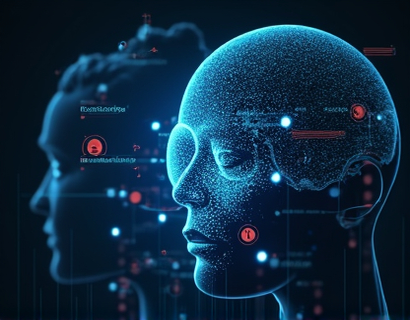Unlocking Digital Transformation: Leveraging Crypto and AI for Enhanced User Engagement in the Next-Gen Ecosystem
The digital landscape is undergoing a profound transformation, driven by the convergence of cryptocurrency and artificial intelligence. This synergy is not just a technological curiosity but a powerful force reshaping user engagement and service delivery across various industries. For tech-savvy professionals and early adopters, understanding the potential of this merger is crucial for staying ahead in the rapidly evolving digital ecosystem. This article delves into the transformative impact of integrating crypto and AI, offering insights into how these advanced technologies can revolutionize user engagement and drive growth and efficiency.
The foundation of this transformation lies in the unique properties of cryptocurrency and the capabilities of AI. Cryptocurrency, with its decentralized and secure nature, provides a robust framework for transactions that are transparent, immutable, and resistant to fraud. On the other hand, AI brings intelligent automation, predictive analytics, and personalized experiences to the table. When combined, these technologies create a powerful synergy that can enhance user engagement in unprecedented ways.
Enhancing Security and Trust
One of the primary benefits of integrating cryptocurrency into digital ecosystems is the enhancement of security and trust. Traditional systems often rely on centralized authorities to manage and verify transactions, which can be vulnerable to breaches and manipulation. Cryptocurrency, by contrast, uses blockchain technology to create a decentralized ledger that is inherently secure and transparent. This means that user data and transactions are protected from unauthorized access and tampering, fostering a higher level of trust among users.
AI complements this by providing advanced security measures such as anomaly detection and predictive threat analysis. By analyzing patterns and identifying unusual activities, AI can proactively detect and mitigate security risks. This dual approach ensures that user data remains safe and that transactions are secure, which is essential for building and maintaining user trust in any digital ecosystem.
Personalization and User-Centric Experiences
AI's strength in personalization is a game-changer for user engagement. By leveraging machine learning algorithms, AI can analyze vast amounts of user data to understand preferences, behaviors, and needs. This insight allows for the creation of highly personalized experiences that cater to individual users, making interactions more relevant and engaging. In a digital ecosystem, this can manifest in tailored content recommendations, customized user interfaces, and personalized notifications.
Cryptocurrency adds another layer of personalization by enabling micropayments and token-based incentives. Users can be rewarded with cryptocurrency for engaging with specific content or services, creating a direct and tangible value exchange. This not only enhances the user experience but also encourages active participation and loyalty within the ecosystem.
Streamlining Transactions and Reducing Friction
Traditional transaction processes can be cumbersome and time-consuming, often involving multiple intermediaries and high fees. Cryptocurrency simplifies this by enabling peer-to-peer transactions that are fast, low-cost, and borderless. This streamlined process reduces friction for users, making it easier and more convenient to engage with digital services.
AI can further optimize this by automating transaction workflows and providing real-time insights into user behavior and preferences. For instance, AI-driven chatbots can assist users in navigating complex processes, offering guidance and support in real-time. This combination of crypto and AI not only speeds up transactions but also enhances the overall user experience by removing unnecessary barriers.
Fostering Innovation and New Business Models
The integration of cryptocurrency and AI opens up new possibilities for innovation and business models. In a traditional setup, monetization strategies are often limited to advertising, subscriptions, and transaction fees. However, with crypto and AI, new revenue streams can be created through tokenization, decentralized finance (DeFi), and smart contracts.
Tokenization allows for the creation of digital assets that can represent various forms of value, from content to services. Users can purchase, trade, and even earn these tokens, creating a dynamic and interactive economy within the digital ecosystem. AI can enhance this by optimizing token distribution, predicting market trends, and personalizing token offerings to maximize user engagement and value.
Smart contracts, powered by blockchain, automate and enforce agreements without the need for intermediaries. This not only reduces costs but also increases efficiency and transparency. AI can further refine smart contracts by analyzing data to ensure compliance and optimize terms based on real-time conditions.
Enhancing Data Privacy and User Control
Data privacy has become a critical concern in the digital age, and the combination of cryptocurrency and AI offers solutions to address this issue. Blockchain's decentralized nature ensures that user data is not stored in a single, vulnerable location, reducing the risk of large-scale data breaches. Additionally, users have greater control over their data, as they can choose what information to share and with whom.
AI can enhance this by providing tools for users to manage their data privacy preferences dynamically. Machine learning algorithms can help users understand the implications of sharing certain data and suggest optimal settings for privacy and personalization. This empowers users to maintain control over their digital footprint while still enjoying the benefits of a connected ecosystem.
Building Community and Collaboration
The convergence of cryptocurrency and AI fosters a sense of community and collaboration among users. Token-based incentives can encourage users to contribute to the ecosystem, whether through content creation, moderation, or other forms of engagement. This creates a self-sustaining environment where users are motivated to participate actively and collaboratively.
AI can facilitate this by analyzing community dynamics and suggesting ways to enhance collaboration. For example, AI-driven platforms can match users with similar interests or skills, fostering meaningful connections and partnerships. This community-driven approach not only enhances user engagement but also drives innovation and growth within the ecosystem.
Challenges and Considerations
While the potential of integrating cryptocurrency and AI is vast, there are challenges and considerations that must be addressed. Regulatory compliance is a significant concern, as the crypto space is still navigating a complex landscape of laws and regulations. Ensuring compliance while leveraging the benefits of crypto and AI requires a proactive and informed approach.
Technical complexity is another factor to consider. Implementing blockchain and AI solutions requires specialized knowledge and resources. Organizations must invest in building a skilled team or partnering with experts to navigate the technical challenges effectively.
Lastly, user education is crucial. Many users are still unfamiliar with cryptocurrency and AI, which can hinder adoption. Providing clear and accessible information, along with user-friendly interfaces, can help bridge this gap and promote wider acceptance and usage.
Conclusion
The integration of cryptocurrency and AI represents a significant leap forward in digital transformation. By enhancing security, personalizing user experiences, streamlining transactions, fostering innovation, and empowering communities, this synergy has the potential to revolutionize user engagement and service delivery. For tech-savvy professionals and early adopters, embracing these advanced technologies is not just an option but a necessity for staying competitive in the next-gen digital ecosystem. As the landscape continues to evolve, those who harness the power of crypto and AI will be at the forefront of shaping the future of digital interactions.









































